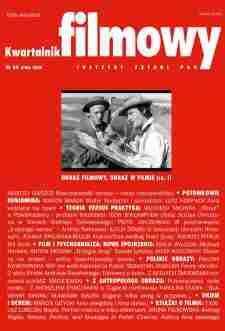W poszukiwaniu "trzeciego sensu". Obraz filmowy w teorii (i praktyce) Andrieja Tarkowskiego jako przyczynek do estetyki Rolanda Barthesa
In Search of "Third Sense". Film Image in Theory (and Practice) of Andrei Tarkovsky - A Contribution to Aesthetics of Roland Barthes
Author(s): Piotr JakubowskiSubject(s): Theatre, Dance, Performing Arts
Published by: Instytut Sztuki Polskiej Akademii Nauk
Keywords: Tarkovsky Andrei; Barthes Roland; third meaning
Summary/Abstract: Writing on film in his essay “Third Meaning” and about the photography in “Camera Lucida”, Roland Barthes used the same research categories that function in analogous structure. He treats chosen photograms and photographies as a prism that evokes the substance of what is striking for him, and thus points to the way of seeing that allows us to open up to the state of mind that signals readiness for experience. In the same time Barthes criticizes the means of presentation in respect to the conditions and limitations these means impose on the viewers’ possibility to adopt the image. Jakubowski argues that these two works by Barthes constitute a line – both are just the different phases of the same theoretical journey. As a consequence – as Jakubowski puts – Barthes chooses the photographic image and rejects the cinematic one. But the analysis of the causes of such volte shows us that it was not the only way to solve the problem put by Barthes. Through analysis of a fragment of Andrei Tarkovsky’s “Mirror” (“Zerkalo”) and using director’s theory of film image, Jakubowsky suggests the alternative way of thinking.
Journal: Kwartalnik Filmowy
- Issue Year: 2008
- Issue No: 64
- Page Range: 68-79
- Page Count: 12
- Language: Polish

